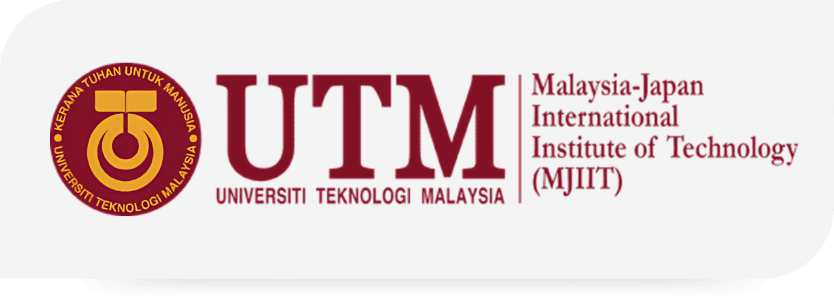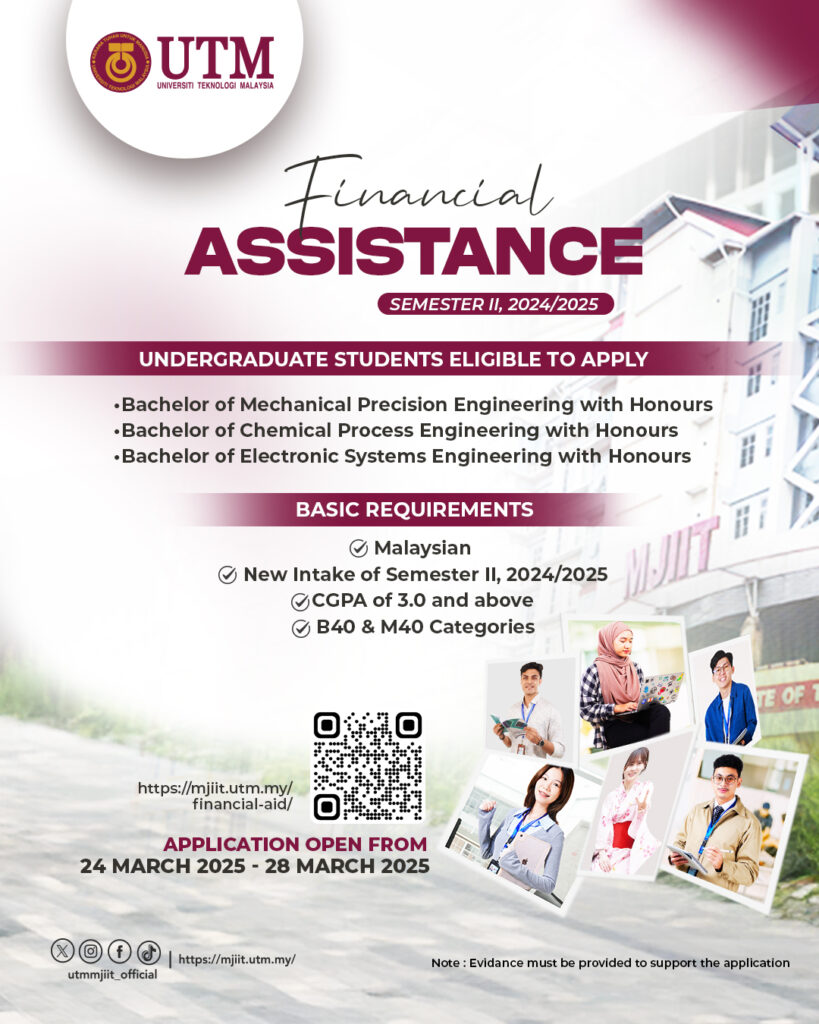Malaysia-Japan International Institute Technology (MJIIT)
Undergraduate
Discover a unique undergraduate journey at MJIIT where academic excellence meets hands-on experience in a dynamic, culturally rich environment.
PROGRAMME EDUCATIONAL OBJECTIVES
PEO1 (TECHNICAL)
Demonstrate mastery of knowledge & competency in manifesting cutting edge technologies
PEO2 (PROFESSIONALISM)
Demonstrate professionalism through innovative, entrepreneurial & global qualities
PEO3 (SUSTAINABLE SOCIETY)
Contribute to sustainable development for the benefits of society
PROGRAMME LEARNING OUTCOMES
PLO1 – ENGINEERING KNOWLEDGE (KW)
Ability to apply knowledge of mathematics, natural sciences, engineering fundamentals, and an engineering specialisation to the solution of complex engineering problems
PLO2 – PROBLEM ANALYSIS (THPA)
Ability to identify, formulate, conduct research literature, and analyse complex engineering problems to reach substantiated conclusions using first principles of mathematics, natural sciences, and engineering sciences
PLO3 – DESIGN DEVELOPMENT (THDS)
Ability to design systems, components or processes and develop solutions for complex engineering problems that meet specified needs with appropriate consideration for public health and safety, cultural, societal, and environmental considerations
PLO4 – INVESTIGATION (THI)
Ability to conduct investigation of complex engineering problems using research-based knowledge and research methods, including design of experiments, analysis and interpretation of data, and synthesis of information to provide valid conclusions
PLO5 – MODERN TOOL USAGE (SCMT)
Ability to create, select and apply appropriate techniques, resources, and modern engineering and IT tools, including prediction and modelling, to complex engineering problems, with an understanding of the limitations
PLO6 – THE ENGINEER AND SOCIETY (AD)
Ability to apply reasoning informed by contextual knowledge to assess societal, health, safety, legal and cultural issues, and the consequent responsibilities relevant to professional engineering practice and solutions to complex engineering problems
PLO7 – ENVIRONMENT AND SUSTAINABILITY (GCS)
Ability to understand and evaluate the sustainability and impact of professional engineering solutions of complex engineering problems in societal and environmental contexts
PLO8 – ETHICS (GSE)
Ability to apply ethical principles and commit to professional ethics, responsibilities and norms of engineering practice
PLO9 – COMMUNICATION (CS)
Ability to communicate effectively on complex engineering activities with the engineering community and with society at large, such as being able to comprehend and write effective reports and design documentation, make effective presentations, and give and receive clear instructions
PLO10 – INDIVIDUAL AND TEAM WORK (TW)
Ability to function effectively as an individual, and as a member or leader in diverse teams and in multi-disciplinary settings.
PLO11 – LIFE LONG LEARNING (SC)
Ability to recognise the need for, and have the preparation and ability to engage in independent and life-long learning in the broadest context of technological change.
PLO12 – ENGINEERING PROJECT MANAGEMENT AND FINANCE (ES)
Ability to demonstrate knowledge and understanding of engineering management principles and economic decision-making and apply these to one’s own work, as a member and leader in a team, to manage projects in multidisciplinary environments
- Undergraduate Programme
- Student Kits
- Final Year Project Page
- Industrial Training
- International Students
- Financial
Overview The Electronic Systems Engineering programme is designed for students who wish to acquire a solid foundation in electronic engineering at system level covering a broad engineering field that encompasses many subfields including those deal with power electronics, instrumentation, telecommunications, robotics and automations, semiconductor materials, IC design, advanced programming, AI & IoT applications, and many others. PROGRAMME CAREER OPPORTUNITIES/PATH (NOT LIMITED TO) The Bachelor of Chemical Process Engineering with Honours (SMJCH) has been designed with a balanced curriculum to give students the knowledge and competency to work professionally as engineers. The curriculum covers basic engineering emphasis and specialisation in chemical engineering. The humanities elements are also embedded in producing well-rounded, morally sound, ethical engineers who communicate effectively. The Chemical Process Engineering program was designed for students who wish to acquire a solid foundation in chemical engineering with deep knowledge of the principles and practices of chemical engineering. This academic program is accredited by the Malaysian Qualifications Agency (MQA/FA9197) and the Board of Engineers Malaysia (2017-2028). It complies with engineering content defined by the Engineering Accreditation Council (EAC) and the Washington Accord. The SMJCH courses are organised into 8 semesters. Semester 1 covers basic knowledge such as communication in English, Programming, Engineering Mathematics, and Introduction to Chemical Process Engineering. Students will be introduced to basic chemical engineering through Thermodynamics during the second semester. In addition, students will be introduced to general university courses such as Graduate Success Attributes. The following year (Semesters 3 and 4) will cover several chemistry and basic chemical engineering courses to develop strong fundamentals, such as Mass and Energy Balance, Fluid mechanics, Chemical Engineering Thermodynamics, and Transport Phenomena. The curriculum is designed to culminate the knowledge from the junior to senior years through thematic integrated projects, ultimately contributing to the mastery of the technical knowledge and soft skills. The projects will be concluded with the capstone project, which the students are expected to design a chemical plant that is technical and financially feasible to operate with avoiding environmental issues. The students will also be taking the undergraduate research project and undergo industrial training for a minimum of 12 weeks. To promote career opportunities in Japan, SMJCH students must take three (3) subjects in the Japanese language. The faculty provides additional preparation classes for the students taking the Japanese Language Proficiency Test (JLPT), an essential qualification for getting hired by companies in Japan. The faculty also provides various opportunities for the students to be exposed to Japanese cultural activities through the Japanese Language and Cultural Center (JLCC). Career Opportunities/Path (not limited to): Graduates from this program can seek employment opportunities as: In the following industries: Graduates of this program will also be prepared for entry into postgraduate education at MJIIT or other universities worldwide. Bachelor of Computer Science (Software Engineering) offers comprehensive subjects that include all analytical and practical skills in software development that emphasize a systematic and disciplined approach to meet the growing needs and demands of the Information and Communications Technology (ICT) industry. Overview Career OpportunitiesBachelor in Mechanical Precision Engineering with Honours (UT6521005)
Programme Total Credit
Programme Duration
Tuition Fees
Programe Fees: UPU/Direct Intake UTM
International
Programme Fees: International Degree Programme (IDP) UTMSpace
International
Entry Requirements
SPM (Compulsory for Local)
STPM/Foundation/Matriculation
Applicants must not have any physical disabilities that might affect practical work.
Diploma
Applicants must not have any physical disabilities that might affect practical work.
A-Level/Australian Matriculation Program (AUSMAT)/International Baccalaureate (IB)
International Students Requirements
Bachelor in Electronic Systems Engineering with Honours (UT6523004)
Programme Total Credit
Programme Duration
Tuition Fees
Programe Fees: UPU/Direct Intake UTM
International
Programme Fees: International Degree Programme (IDP) UTMSpace
International
Entry Requirements
SPM (Compulsory for Local)
STPM/Foundation/Matriculation
Applicants must not have any physical disabilities that might affect practical work.
Diploma
Applicants must not have any disabilities (color blind/deaf/mute/physical disability) that might affect practical work and learning process.A-Level/Australian Matriculation Program (AUSMAT)/International Baccalaureate (IB)
International Students Requirements
Bachelor in Chemical Process Engineering with Honours (UT6524004)
Description


Programme Total Credit
Programme Duration
Tuition Fees
Programe Fees: UPU/Direct Intake UTM
Programme Fees: International Degree Programme (IDP) UTMSpace
Entry Requirements
SPM (Compulsory for Local)
STPM/Foundation/Matriculation
AND
Obtained at least BAND 2.0 in the Malaysian University English Test (MUET) for the examination since session 1 year 2021 or BAND 2 for examination until year 2020 based on the validity of the result during the application date.
AND
Candidate should not have disability (blind/deaf/mute/physical disability) that could create inconveniences in learning and performing practical work.
*Only open for Foundation/ Matricution from Matriculation KPM (science/ engineering stream), Foundation in Sciences UM, Foundation in Engineering UiTM, Foundation in Sciences UiTM, Foundation PintarUKM, Foundation UTM.
Diploma
A-Level/Australian Matriculation Program (AUSMAT)/International Baccalaureate (IB)
International Students Requirements
Bachelor in Software Engineering with Honours
Programme Total Credit
Programme Duration
Tuition Fees
Programe Fees: UPU/Direct Intake UTM
Programme Fees: International Degree Programme (IDP) UTMSpace
Entry Requirements
SPM (Compulsory for Local)
STPM/Foundation/Matriculation
Diploma
A-Level/Australian Matriculation Program (AUSMAT)/International Baccalaureate (IB)
International Students Requirements
Bachelor of Science (Industrial Mathematics) with Honours
Graduates of this 4-years programme will be mathematically competent professionals capable of dealing with qualitative and quantitative problems in related industries. Be able to assume productive roles and positions in planning, decision making, analysis and supervision of work in the
industries and public sectors. Exhibit team working and leadership skills with effective communication and desirable interpersonal skills. Pursue life-long learning, enabling them to identify, adapt and seize business opportunities.
1. Data Scientist
2. Actuary
3. Operation Research Analyst
4. Risk Analyst
5. Statistician/ Mathematician
6. Quality Assurance ManagerProgramme Total Credit
Programme Duration
Tuition Fees
Programe Fees: UPU/Direct Intake UTM
Programme Fees: International Degree Programme (IDP) UTMSpace
Entry Requirements
SPM (Compulsory for Local)
STPM/Foundation/Matriculation
and
Obtain at least a Grade C (CGPA 2.00) at the STPM level
in any ONE (1) of the following subjects:
and
Obtain at least a credit (Grade C) at the SPM level in the
following subject:
and
Obtain at least Band 2 in the MUET examination.Diploma
or
Obtained at least Grade C in any Mathematics course at the Diploma level.
or
Achieved at least Band 2 in the MUET examination.
Note:
The year of admission and actual study duration are subject to credit exemptions approved by UTM.A-Level/Australian Matriculation Program (AUSMAT)/International Baccalaureate (IB)
and
Obtain at least a credit (Grade C) in Mathematics at the SPM level;
and
Achieve at least Band 2 in the MUET examination.International Students Requirements
BRIEFING FOR NEW STUDENTS SEMESTER II, 2024/2025
Guideline For New Students RegistrationRegistration Guide |
Guideline for Course RegistrationClick Here |
Guideline Book2024/2025 (NEW)
|
Guideline for Credit TransferClick here |
Guideline for Graduate VerificationClick here |
Academic FormsClick here |
Academic RegulationsClick here |
Academic CalendarSemester II 2024/2025 |
Verification LetterClick here |
TimetableList of Course Offered
|
Work ScheduleClick here |
Programme CoordinatorsClick here |
All the announcements, course information, rubrics, evaluations and submissions of UTM MJIIT Final Year Project are done in THIS website
All the evaluations and submissions of UTM MJIIT Industrial Training are done in THIS website
Visa Matters
EMGS Update
Email : isckl@utm.my

